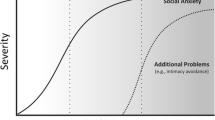Abstract
This single case study describes an outpatient psychodynamic therapy group for recovering alcoholic couples established in the Family Studies Unit, Laboratory of Clinical Studies, National Institute of Alcohol Abuse and Alcoholism. While depression in the recovering alcoholic is widely recognized, the authors stress their observation of recurrent depression in the “well” spouse and note a tendency for depression to alternate between members of a couple. The authors suggest clinicians need sensitivity to this issue and that a psychodynamic therapy group is an effective treatment modality for married alcoholics and their spouses.
Similar content being viewed by others
References
Beck, A. T. (1978).Depression scale. Philadelphia: Center for Cognitive Therapy.
Brown, S. (1985).Treating the alcoholic: A developmental model of recovery. New York: Wiley.
Chassell, K. (1938). Family constellation in the etiology of essential alcoholism.Psychiatry, 1, 473–503.
Corder, B. F., Corder, R. F., & Ladilaw, N. L. (1972). An intensive treatment program for alcoholics and their wives.Quarterly Journal of Studies on Alcohol, 33, 1144–1146.
Davenport, Y., & Mathiasen, E. (1988, February). Couples group treatment of the married alcoholic. Paper for the American Group Association Annual Meeting.
Gallant, D. (1987).Couples group psychotherapy with substance abusers. Info Medix tape 12A and B.
Gallant, D., & Mallott, D. (1983). Intervention techniques and married couples group therapy. In S. Zimbers & S. Blume (Eds.),Practical Techniques of Psychotherapy for Alcoholism. New York: Plenum.
Gallant, D., Rich, A., & Bey, E. (1970). Group psychotherapy with married couples: A successful technique in New Orleans alcoholism clinic patients.Journal of Louisiana State Medical Society, 122, 41–44.
Gurman, A., & Kniskern, D. (1981). Family therapy outcome research: Knowns and unknowns. In A. Gurman & D. Kniskern (Eds.),Handbook of family therapy. New York: Brunner/Mazel.
Harwin, J. (1982).Alcohol and the family. New York: St. Martins Press.
Hollingshead, A., & Redlich, F. (1958).Social class and mental illness. New York: Wiley.
Knight, R. (1937). The dynamics and treatment of chronic alcohol addiction.Bulletin of the Menninger Clinic, 1, 233.
Paolino, T., & McGrady, B. (1976). Joint admission as a treatment modality for problem drinkers: A case report.American Journal of Psychiatry, 133, 222–224.
Spitzer, R., & Endicott, J. (1978a).Schedule for affective disorders and schizophrenia—Lifetime version. New York: Department of Mental Hygiene.
Spitzer, R., & Endicott, J. (1978b).Family history research diagnostic criteria. New York: Department of Mental Hygiene.
Steinglass, P. (1976). Experimenting with family treatment approaches to alcoholism, 1970–1975: A review.Family Process, 15, 97–123.
Steinglass, P., Davis, D., & Berenson, D. (1977). Observations of conjointly hospitalized “alcoholic couples” during sobriety and intoxication: Implications for theory and practice.Family Process 16, 1–16.
Vannicelli, M. (1982). Interactional group therapy with alcoholics: Special techniques.Journal of Studies on Alcohol, 43, 13–37.
Yalom, I. D. (1975).The theory and practice of group psychotherapy. New York: Basic Books.
Author information
Authors and Affiliations
Rights and permissions
About this article
Cite this article
Mathiasen, E.H., Davenport, Y.B. Reciprocal depression in recovering alcoholic couples: The efficacy of psychodynamic group treatment. Group 12, 45–55 (1988). https://doi.org/10.1007/BF01419851
Issue Date:
DOI: https://doi.org/10.1007/BF01419851




